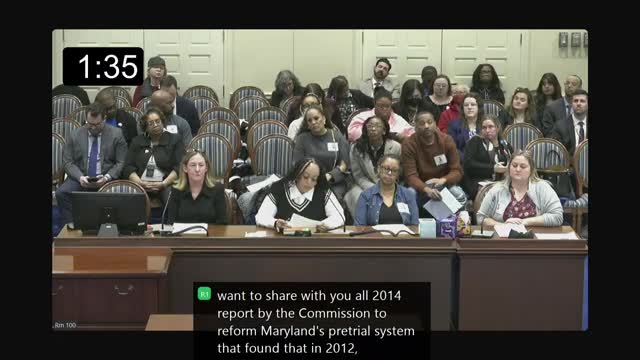Families, prosecutors push restoring 10-year limit for dangerous incompetent defendants after 5-year drop
Get AI-powered insights, summaries, and transcripts
Subscribe
Summary
House Bill 195 would restore a previous 10-year window to keep charges pending against defendants deemed incompetent to stand trial in the most serious, dangerous cases if clinicians indicate more time may allow restoration.
House Bill 195 would restore a 10-year maximum period (previously reduced to five years after repeal of capital punishment language) during which criminal charges may remain pending for defendants found incompetent to stand trial for certain dangerous charges (such as first-degree murder and related offenses) when doctors believe additional time could restore competency.
Supporters included victims— family members, Baltimore City prosecutors, and mental-health court staff. Several speakers told the committee about tragic cases involving victims who were children or people with disabilities and described defendants who were initially found incompetent and later released when charges timed out. A victim's father and a mother whose daughter was murdered urged more time to ensure defendants either can be restored to competency and tried or civilly committed when warranted.
Clinicians and prosecutors described the statute—s interaction with hospital commitment processes and noted that some defendants with intellectual or developmental disabilities cannot be civilly committed under existing DDA law even when dangerous — an outcome witnesses said could leave victims unprotected. Disability Rights Maryland urged caution, saying national precedent (Jackson v. Indiana) limits civil detention to the period reasonably necessary to determine whether a defendant is restorable; DRM argued that, in practice, most restorations happen much sooner and that indefinite detention is legally risky.
Proponents said the bill is narrow and targets a small population of the most serious dangerous defendants; they recommended procedural safeguards including continued six-month competency reassessments and judicial discretion to dismiss. Witnesses said the bill would not remove constitutional protections; courts would still be required to dismiss charges if restoration is not possible and to pursue involuntary civil commitment where appropriate.
The committee discussed statutory text and potential amendments; no final vote was taken during the hearing.
